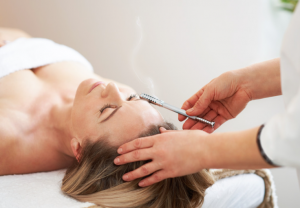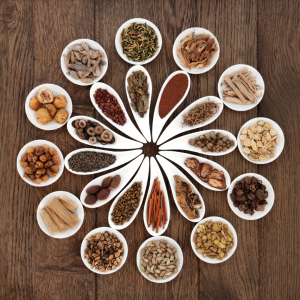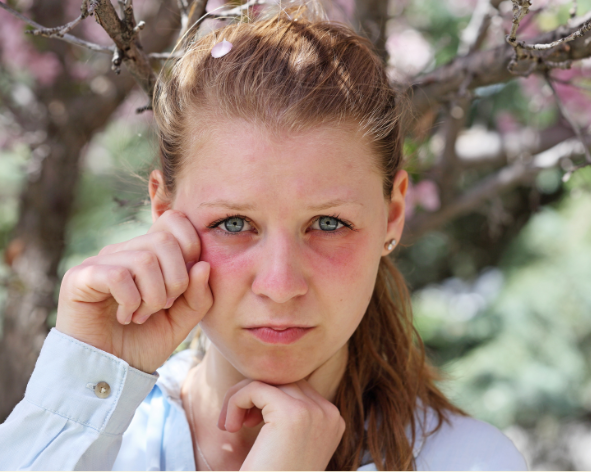Sneezing, runny nose, itchy eyes, and nasal congestion are just a few of the irritating symptoms that accompany this seasonal condition. While conventional treatments such as antihistamines and decongestants are widely used, many individuals are increasingly seeking alternative approaches, such as acupuncture and Chinese herbal medicine, in order to alleviate their hay fever symptoms quicker.
Understanding Hay Fever from a TCM Perspective
In traditional Chinese medicine (TCM), hay fever is viewed as an imbalance in the body’s Defense Qi. Rather than merely addressing the symptoms, TCM practitioners aim to address the root cause of the issue by restoring balance to the body. According to TCM theory, hay fever is often caused by external factors (such as wind, heat, or cold) that invade the body, as well as internal imbalances, particularly a deficiency in the Lung, Kidney, and Spleen Qi.
How Acupuncture Can Help with Hay Fever

Acupuncture, a key component of TCM, helps to improve the immune system and remove excessive dampness or heat in the body. For hay fever, acupuncture targets points that strengthen the immune system, clear nasal passages, and relieve inflammation.
Research suggests that acupuncture can be very helpful in reducing the symptoms of hay fever by:
- Reducing inflammation: Acupuncture has been shown to modulate the immune response, helping to reduce the body’s overreaction to allergens.
- Opening the airways: By stimulating points related to the respiratory system, acupuncture can help relieve nasal congestion and ease breathing.
- Balancing immune function: Acupuncture can regulate the body’s immune system, reducing the likelihood of overreacting to pollen and other allergens.
- Relieving stress: Hay fever sufferers often find their symptoms worsen with stress. Acupuncture is known for its calming effects, which can indirectly reduce the severity of allergic reactions.
Many individuals experience symptom relief after just a few sessions of acupuncture; however, a full course of treatment is often recommended for more sustained and longer-lasting effects.
Chinese Herbal Medicine for Hay Fever

Alongside acupuncture, Chinese herbal medicine is frequently used to treat hay fever. Herbal formulas are tailored to the individual’s specific symptoms and underlying imbalances, with the goal of strengthening the immune system and reducing the body’s sensitivity to allergens.
Some common herbs used in Chinese medicine for hay fever include:
- Xanthium Fruit (Cang Er Zi): This herb is often used to open nasal passages and relieve congestion.
- Magnolia Flower (Xin Yi Hua): Known for its ability to clear nasal blockages and reduce inflammation, this herb is commonly used in hay fever treatments.
- Astragalus (Huang Qi): A powerful herb for boosting immune function, astragalus helps fortify the body’s defenses and is often used in the early stages of hay fever.
- Angelica Root (Bai Zhi): Angelica is used to dispel wind and dampness, key factors in TCM’s understanding of hay fever, and helps to alleviate sinus headaches.
These herbs are typically combined into a custom formula designed by a TCM practitioner, who will take into account the individual’s specific symptoms and underlying constitution. Herbal medicine can be taken in the form of teas, pills, or powders, depending on the person’s preference.
What Does the Research Say?
A systematic review evaluated the effects and safety of acupressure for respiratory allergic diseases by analyzing randomized controlled trials (RCTs). The review found that acupressure improved allergic rhinitis (AR) nasal symptoms more effectively than ephedrine nasal drops with thermal therapy. Additionally, acupressure combined with salbutamol enhanced pulmonary function in asthma patients compared to salbutamol alone. [1]
Is It Right for You?
Are you struggling with some health issues that you’d like to address?
At Happinpuncture, we specialize in helping New Zealanders deal with their conditions in holistic and reliable ways. Our talented team of practitioners is experienced and skilled, and we’d love to see what we can do for you.
If you would like any additional information on any of our services, we’d love to speak with you. To get in touch, simply call our team at 09-2182992 or leave us a message here.
Get better faster with Happipuncture.




